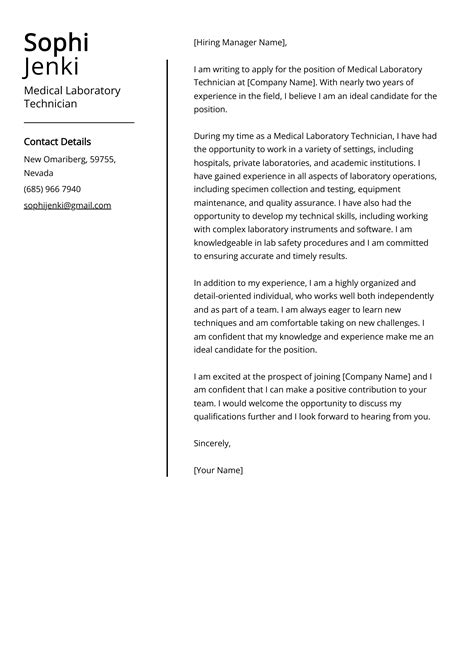Are you interested in pursuing a career as a lab technician? This profession is essential in various scientific fields, including medical research, forensic science, and environmental monitoring. Lab technicians play a crucial role in assisting scientists and researchers with experiments, testing, and data analysis. In this article, we will provide a comprehensive guide to help you navigate the application process and kick-start your career as a lab technician.
What is a Lab Technician?
A lab technician, also known as a laboratory technician or laboratory assistant, is a skilled professional responsible for conducting tests, analyzing data, and maintaining laboratory equipment. They work in various settings, including hospitals, research institutions, universities, and private laboratories. Lab technicians assist scientists and researchers with experiments, prepare samples for testing, and record data. They also maintain laboratory equipment, troubleshoot issues, and ensure compliance with safety protocols.

Key Responsibilities of a Lab Technician
Some of the primary responsibilities of a lab technician include:
- Conducting tests and experiments
- Analyzing data and recording results
- Maintaining laboratory equipment and supplies
- Preparing samples for testing
- Troubleshooting equipment issues
- Ensuring compliance with safety protocols
- Assisting scientists and researchers with experiments
Education and Training Requirements
To become a lab technician, you typically need to complete a post-secondary education program in a relevant field, such as biology, chemistry, or laboratory technology. Many community colleges and universities offer associate's degree or certificate programs in laboratory technology. These programs usually include coursework in laboratory procedures, safety protocols, and data analysis.
Some lab technicians may also choose to pursue a bachelor's degree in a relevant field, which can lead to advanced career opportunities. In addition to formal education, many lab technicians also receive on-the-job training, which can last from a few months to a year.
Certification and Licensure
While certification is not always required, it can be beneficial for lab technicians who want to advance their careers. The American Society for Clinical Pathology (ASCP) offers certification for lab technicians, which demonstrates expertise in laboratory procedures and safety protocols.
In some states, lab technicians may also need to obtain licensure to work in certain settings, such as hospitals or medical research institutions.
Career Path and Job Outlook
The job outlook for lab technicians is excellent, with the Bureau of Labor Statistics predicting a 11% growth in employment opportunities from 2020 to 2030. This growth is driven by an increasing demand for scientific research and testing in various fields.
Lab technicians can work in various settings, including:
- Hospitals and medical research institutions
- Universities and research institutions
- Private laboratories and testing facilities
- Environmental monitoring agencies
- Forensic science laboratories
With experience and advanced education, lab technicians can also move into supervisory or management roles, such as laboratory manager or research coordinator.
Salary Range
The salary range for lab technicians varies depending on the setting, location, and level of experience. According to the Bureau of Labor Statistics, the median annual salary for lab technicians was $52,610 in May 2020.
Here are some average salary ranges for lab technicians in different settings:
- Hospitals and medical research institutions: $45,000 - $65,000 per year
- Universities and research institutions: $40,000 - $60,000 per year
- Private laboratories and testing facilities: $50,000 - $75,000 per year
- Environmental monitoring agencies: $45,000 - $70,000 per year
- Forensic science laboratories: $50,000 - $80,000 per year
Skills and Qualities
To be successful as a lab technician, you need to possess certain skills and qualities, including:
- Attention to detail and accuracy
- Strong analytical and problem-solving skills
- Excellent communication and teamwork skills
- Ability to work in a fast-paced environment
- Strong organizational and time management skills
- Familiarity with laboratory equipment and procedures
- Ability to follow safety protocols and procedures
Application Process
To apply for a lab technician position, you typically need to submit a resume, cover letter, and transcripts. Many employers also require applicants to pass a background check and provide proof of certification or licensure.
When applying for a lab technician position, be sure to highlight your relevant education, training, and experience. You should also emphasize your skills and qualities, such as attention to detail and analytical skills.

Conclusion
Pursuing a career as a lab technician can be a rewarding and challenging experience. With the right education, training, and skills, you can succeed in this field and contribute to scientific research and discovery.
Remember to highlight your relevant education, training, and experience when applying for a lab technician position. Emphasize your skills and qualities, such as attention to detail and analytical skills.
By following these tips and guidelines, you can navigate the application process and start your career as a lab technician.
Gallery of Lab Technician





What is the average salary for a lab technician?
+The average salary for a lab technician varies depending on the setting, location, and level of experience. However, the median annual salary for lab technicians was $52,610 in May 2020.
What are the education and training requirements for a lab technician?
+To become a lab technician, you typically need to complete a post-secondary education program in a relevant field, such as biology, chemistry, or laboratory technology. Many community colleges and universities offer associate's degree or certificate programs in laboratory technology.
What are the skills and qualities required for a lab technician?
+To be successful as a lab technician, you need to possess certain skills and qualities, including attention to detail and accuracy, strong analytical and problem-solving skills, excellent communication and teamwork skills, and familiarity with laboratory equipment and procedures.
